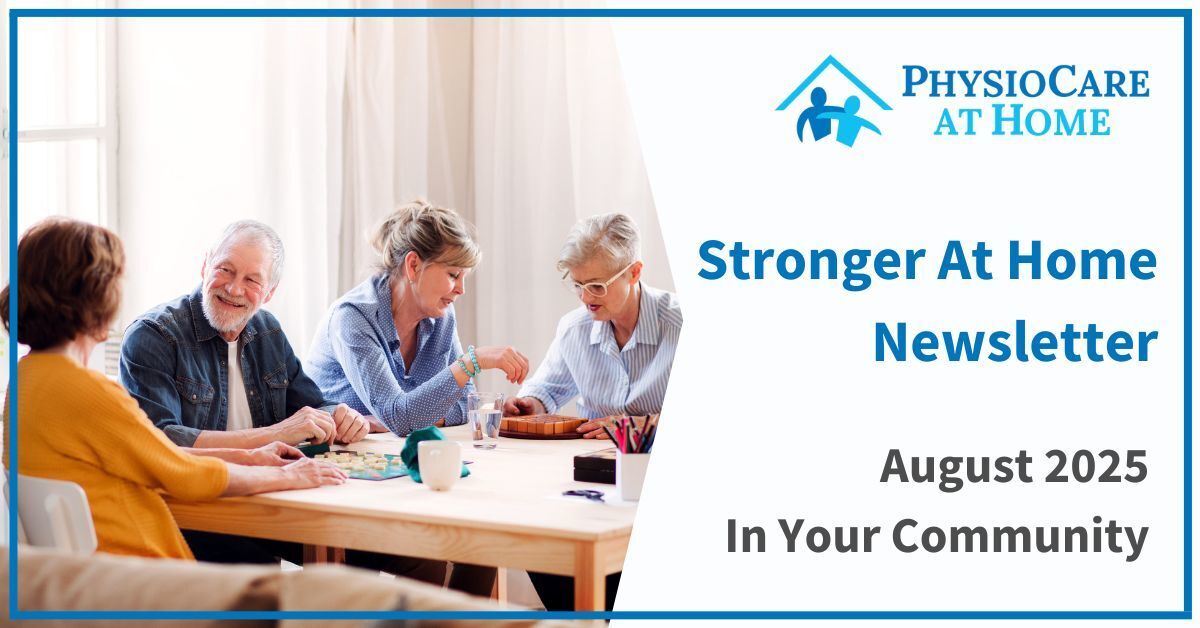|
A message from our Clinical Director, Jillian
|
|
|
|
|
|
|
|
|
|
|
|
|
|
|
|
Let’s talk about COMMUNITY and why we all need it, especially as we age!
Staying active isn’t just about exercise—it’s about engaging in all aspects of life. And as we age, staying connected with our community is one of the most powerful ways to maintain health — mind, body, & soul. Research consistently shows that older adults who participate in community activities experience better physical health, stronger cognitive function, reduced feelings of loneliness, and even increased longevity. Regular community participation is linked to reduced disability and a slower rate of cognitive decline. Walking to a local event, taking part in group classes, or simply chatting with others provides movement, mental engagement, and a sense of purpose. These factors are strongly linked to reduced risk of falls, better cardiovascular health, and slower cognitive decline.
The Benefits of Staying Engaged
- Physical Health: Group exercise (walking clubs, aquafit, chair yoga) improves balance, reduces falls, and strengthens the heart
- Mental Health: Regular social contact lowers rates of depression and anxiety and improves resilience
- Cognition: Social participation is strongly associated with slower memory loss and reduced risk of dementia
- Longevity: People with strong social networks live significantly longer than those who are isolated
If you live with mobility limitations, pain, or anxiety, getting out into the community can feel overwhelming. But staying engaged is one of the best things you can do for both your body and your mind. Finding the right fit for you can make all the difference. And if you’re not sure where to start, ask a friend or family member to help or call your local recreation or seniors centre.
Where to Start - Consider some of the options listed below to engage in your community.
- Local Seniors Clubs & Centres: Join activities like card games, dance nights, or coffee mornings.
- Walking & Hiking Clubs: Great for fitness and meeting like-minded friends. Many have beginner-friendly or slower-paced groups.
- Aquafit or Gentle Fitness Classes: Low-impact exercise that’s easy on joints while improving strength and balance.
- Volunteering: Offer your time at local libraries, museums, food banks, or schools—purpose and movement combined.
- Community Gardening: Fresh air, light exercise, and the joy of growing food or flowers.
- Craft & Hobby Groups: Knitting circles, art classes, and woodworking groups encourage fine motor skills and creativity.
- Church: A local community of faith can offer many opportunities for connection and support.
- Transportation Services: Many towns offer shuttle buses or volunteer drivers to help you access programs and shops.
- Grocery Delivery & Errand Services: Access helpful services so you can save energy for the activities you enjoy most.
For those with Mobility or Cognitive Challenges - Look for:
- Accessible fitness programs like chair yoga, seated Tai Chi, resistance band training or condition-specific programs for Parkinson’s, MS, arthritis, or dementia.
- Adaptive aquatics with pool lifts and warm-water classes.
- Memory cafés offering social activities for people living with dementia and their caregivers.
- Online classes and virtual clubs for those unable to attend in person.
- In-home volunteer visits for companionship and activity.
Practical Tips for Safe Community Participation
1. Plan Your Outings
- Choose familiar routes and locations that are accessible (ramps, elevators, seating areas).
- Call ahead to community centres or clubs to ask about accessibility features or quieter times of day.
2. Use Mobility Aids with Confidence
- A cane, walker, or wheelchair isn’t a limitation—it’s a tool for independence.
- Physiotherapists and Occupational therapists can help you select and adjust devices so you feel secure.
3. Break Activities into Steps
- Start small: a short walk to the corner store, 15 minutes at a gardening club, or one new class. Gradual exposure builds stamina and confidence.
4. Manage Anxiety with Preparation
- Practice deep breathing before heading out.
- Bring a friend or family member the first few times to ease transitions.
- Some community programs offer “buddy systems” to help older adults feel supported.
5. Explore Alternative Participation
- If going out feels too challenging, look for hybrid or online programs offered by local libraries, seniors’ centres, or recreation departments.
6. Transportation Solutions
- Many cities offer accessible transit, volunteer driver programs, or shuttle buses for seniors. Ask your community centre or city hall for details.
If you are keen to get out into your community, but you just don’t feel like you have the strength or stamina required, we can help you reach your goal!Get an individualized Assessment & Treatment Plan with one of our amazing Therapists TODAY, so you can keep moving in the right direction.
Our PhysioCare at Home team can help. Call us today!
Every step you take toward connecting with your community is a step toward better health and quality of life, because Movement is Medicine.
To Your Health,
Jillian
Physiotherapist & Clinical Director
|
|
|
|
|
|
Check out our Welcome Video below
|
|
|
|
|
|
|
|
|
|
|
|
Foundational Principle Highlight
|
|
|
|
|
Every step you take toward connecting with your community is a step toward better health and quality of life, because Movement is Medicine!
|
|
|
|
|
|
|
|
|
|
|
Therapist’s Corner
-
The best place to get connected with other older adults in your community is your local Seniors Centre or YMCA. Visit their website, pick up a program guide, or stop in and say hi — there is something for everyone! Check out some websites below to get you started:
-
Have you heard of: Men’s Sheds Canada? Their vision is “A Canada where every man feels valued and engaged in his community, experiencing purpose, belonging, and well-being in his aging journey.” There are many ‘sheds’ to join all across the country! Check to see if there is one in your community.
-
Did you know anyone can join the Royal Canadian Legion? With locations in most Canadian cities, they are an inviting neighbourhood hub & a great place for connection: Find a Branch
-
Search for a local walking club in your city to join others and explore some new or familiar areas together. If you’re in BC: Walking Groups — Seniors on the Move
-
Do you like to sing? Try finding a local choir. Singing in a choir is more than just music — it’s joy, friendship, and wellness all rolled into one
|
|
|
|
|
|
|
|
|
|
|
|
|
|
|
|
|
Client Spotlight
Murray built up the courage to do a physio session at the community pool with her Physiotherapist, Carmen. Murray took an accessible taxi by herself to meet Carmen at the pool. They transferred her to a water wheelchair with a lift in the change room, and then navigated the pool together for the first time. Murray was able to achieve her goal of standing again with the buoyancy of the water to help her. She even got to experience a hot tub for the first time in her life. It was a great day for both client and therapist!
|
|
|
|
|
|
|
|
|
|
|
|
|
Nutrition Tip
Try getting involved in a Community Garden! Community gardens bring together physical, mental, social, and environmental benefits.
Physical Health & Mobility
- Low-impact activity: Tasks like watering, planting, and weeding help improve flexibility, strength, and coordination without overstressing the body.
- Getting Vitamin D: Sunlight exposure supports bone health and immune function.
- Safety features: Raised beds, wide pathways, benches, and adaptive tools reduce strain and risk of falls.
Mental, Emotional & Cognitive Well-Being
- Stress reduction and calm: Being in nature and engaging in rhythmic gardening tasks can calm the mind and reduce anxiety.
- Cognitive stimulation: Planning planting layouts, learning plant care, and recalling schedules engage memory and planning skills.
- Sense of purpose & accomplishment: Nurturing plants from seed to harvest fosters pride and fulfillment.
Social Connection & Learning
- Combating isolation: These gardens bring people together, fostering friendships and community bonding.
- Shared learning: Workshops and peer support offer a rich learning environment for everyone—novices and veterans alike.
- Inter-generational engagement: Some community gardens do a good job of connecting seniors with schools and volunteers for mutual enrichment.
Nutrition & Environmental Awareness
- Access to fresh produce: Growing fruits, veggies, and herbs encourages healthier eating and food security
- Sustainable practices: Gardening encourages composting, biodiversity, and ecologically friendly methods
Check out this recipe for a Gardener’s Raw Vegetable Salad with creamy Italian dressing from www.thekitchn.com
|
|
|
|
|
|
|
|
|
|
|
|
Get Stronger & Stay Independent with
In-Home Physiotherapy, Occupational Therapy, & Personal Training
|
|
Currently serving communities in:
- Nova Scotia - New Brunswick - Ontario - Alberta - British Columbia -
|
|
|
|
|
|
|
|
|
|
|
|
|
|



